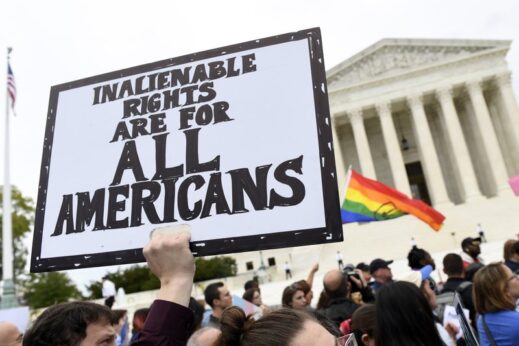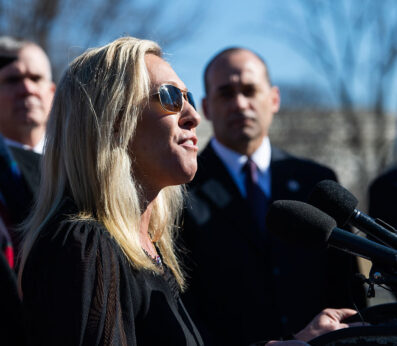
While the Republican Party is making headlines for opposing President Biden’s American Rescue Plan aimed at saving millions of Americans from total ruin, it’s still got plenty of energy to block another piece of progressive legislation coming out of Washington. On Feb. 25, a divided House narrowly passed the Equality Act, an historic bill that would extend civil rights protections to prohibit discrimination on the basis of sexual orientation or gender identity. Like the economic rescue package, this bill also faces steep opposition in the Senate, as the GOP is attempting to create a narrative around the bill based on fear.
The bill builds upon the historic 1964 Civil Rights Act by aiming to include sexual orientation and gender identity as protected classes in addition to race, religion, sex, and national origin. The Equality Act follows the recent United States Supreme Court ruling that gay and transgender people could not be fired from their jobs under existing federal anti-discrimination laws. Under this new bill, protection—for everyone—would be expanded to include housing, education, all federally-funded programs, and a broad range of “public accommodations.”
Passage of the legislation would drastically change the terrain for the LGBTQ equality struggle by offering expansive legal protections for the first time. This is significant because this is a community that statistic after statistic has shown faces high levels of discrimination in multiple areas of their lives.
Major changes
Under the Equality Act, the meaning of “public accommodations” will be greatly expanded. The bill broadens the term beyond things like hotels, motels, restaurants, theaters, and stadiums found in early legislation to now add any establishment that provides “exhibition, entertainment, recreation, exercise, amusement, public gathering, or public display.” The bill then goes further by adding, “any establishment that provides a good, service, or program,” which includes retail stores, banks, and the like. Transportation services, such as trains and taxis, would also be covered under public accommodations. Essentially, the bill will provide protection against discrimination in any space used by the public.

What this means is that more businesses and establishments would have little defense for refusing service to individuals based on their sexual orientation or gender identity, as they would all fall under public accommodations. This has been a hot button issue in the past with businesses like bakeries and flower shops that have discriminated against individuals in the LGBTQ community with claims that serving them would violate the business owner’s freedom of religion. The most well-known example was a 2018 U.S. Supreme Court case in which justices ruled in favor of a baker who did not want to provide a cake to a same-sex wedding.
Although the Equality Act is noteworthy for the protections it extends to the LGBTQ community, it is important because the expansion of what counts as a public accommodation affects all protected groups under the pre-existing Civil Rights Act and the Americans with Disabilities Act. The Equality Act would outlaw unequal treatment or harassment of all individuals that fall under any protected category where there are currently limitations. Since the bill gets very specific, it leaves little room for businesses to claim that they are not public accommodations, so they will find it difficult to exempt themselves when accused of discrimination.
The legislation also prevents businesses from relying on the Religious Freedom Restoration Act (RFRA) to counter claims of discrimination. The RFRA, passed in 1993, gave space for individuals and corporations to argue against government laws that they claimed infringed upon their religious freedom. The Equality Act specifically names the RFRA and says it cannot be used as a pretext for discrimination against protected groups.
This is significant because the RFRA has been used in the past, such as in the landmark case of Burwell v. Hobby Lobby, where the Supreme Court ruled that the contraceptive mandate under the Patient Protection and Affordable Care Act (requiring companies to pay for employee health insurance that included birth control) violated the owners of Hobby Lobby’s right to religious freedom.
Further, the Equality Act makes it so legislation protecting members of the LGBTQ community is permanently enshrined in federal law. This is a crucial change because currently only 22 states and the District of Columbia prohibit discrimination based on sexual orientation and gender identity—less than 50% of the country.
The Equality Act was first passed in the House in 2019 but was blocked by a Republican-dominated Senate and the threat of a Trump veto even if it had made it out of the upper chamber. With Democrats now in the majority in both houses of Congress, there is more of a chance for the bill to become law, but obstacles of narrative and legislative technicalities still stand in the way.
The GOP fear narrative
Although the Republican Party has been seemingly turning in on itself with post-election internal divisions, its elected officials have remained united against the Equality Act. They are creating a narrative around the legislation that attempts to paint the religious right as victims and those in the LGBTQ community as the “other” to be ostracized and resisted.
Those who oppose the bill claim it will infringe on First Amendment rights, in particular religious liberty and free speech. The conservative think tank The Heritage Foundation claims on its website that the Equality Act will punish citizens “for their views on biological sex.” The organization asserts that businesses will suffer, and workers will lose their jobs for not conforming to “new sexual norms.”
Texas Republican Rep. Chip Roy tried arguing in a recent press conference that the legislation was a ploy by the “cultural elite” to “tell us what we’re supposed to believe.”

His GOP colleague, conspiracy theory Q-Anon supporter Marjorie Taylor Greene of Georgia, posted a sign outside her office reading: “There are TWO genders: MALE & FEMALE. Trust The Science!” Greene’s transphobic antics were in response to House Democrat Marie Newman hanging a transgender pride flag outside of her office, which is across the hall from Greene, in support of the Equality Act and her transgender daughter.
House Republicans who have never made any show of concern for women’s equality are now peddling an apocalyptic forecast for female sports and spaces dedicated to women. Many have claimed that the Equality Act would endanger women’s rights. GOP Rep. Jim Jordan of Ohio shared on his Twitter a Wall Street Journal opinion article insisting the measure would “threaten the existence of women’s prisons, public-school girls’ locker rooms, and women’s and girls’ sports teams.”
This is an argument that has often been used by conservatives to oppose transgender rights legislation. They attempt to criminalize transgender women as potential rapists and sex offenders preying on women. The truth of the matter is that the bill actually contains protections that prevent discrimination against women as well. The Equality Act does not make it an either-or situation.
Further, one of the main arguments made by conservatives against the bill contradicts their concern for women’s rights. Under the new legislation, abortion rights could potentially be expanded because the measure includes healthcare facilities under public accommodations, which cannot discriminate based on sex, and says that “pregnancy, childbirth, or a related medical condition shall not receive less favorable treatment than other physical conditions.” Republicans worry that the phrase “related medical condition” could be an argument for abortion coverage.
The conservative right has been engaging in a state-by-state attack on women’s access to safe abortions and other medical procedures for years, with their efforts especially ramping up in 2019. This makes their outcry for protecting women’s rights ring hollow, to say the least.
The conservative group Alliance Defending Freedom called the Equality Act “dangerous” and claimed it needed to be rejected “for the good of all Americans.” Yet, statistics and evidence aren’t in their favor, as public sentiment shows many people in the U.S. to be open and ready for the change the measure would bring.
Support and uphill battle
The Human Rights Campaign, one of the country’s top LGBTQ organizations, described the Equality Act as “bringing us closer to ensuring that every person is treated equally under the law.” Mara Keisling, executive director of the National Center for Transgender Equality, stated that “no act of Congress can end bias overnight or stop all attacks against transgender people. But the Equality Act is a clear, consistent, and nationwide statement that says our country believes that all people—including those who are transgender—should be treated fairly and with respect.”
Advocates for the bill seem to be tuning into what many across the country favor. According to the Public Religion Research Institute, an estimated 83% of Americans favor laws that would protect those in the LGBTQ community against discrimination in jobs and housing. This includes 68% of people who identify as Republican.
Yet it would seem that the GOP is out of touch with the public’s wants and needs—again—as it appears Senate Republicans are unlikely to allow the bill to pass if given the chance. Republicans who are seen as “moderate” have declined to say how they would vote, while Sen. Mitt Romney of Utah has gone on record saying he will not support it.
If Republicans mount a filibuster (which is an attempt to block or delay Senate action on a bill by debating it at length), ten GOP senators would have to break ranks in order for the bill to survive. The legislation narrowly passed in the House with only three Republicans supporting it. If the filibuster is allowed to continue, it would become another example of the GOP’s continued use of this tool to thwart the will of the majority. There is a long history of this, and it may turn the Equality Act, like many other progressive bills that have died on the Senate floor, into empty political gestures that aren’t allowed to ever become reality.
Despite the Republican Party attempting to create an atmosphere of panic around the Equality Act, it is clear that such a measure would mean so much to so many. It would be a major step forward in combating decades of discrimination embedded in a system that at times thrives on exploitation and division. The will of the people seem to be leaning towards it, even if the GOP wants to make the world believe otherwise.










